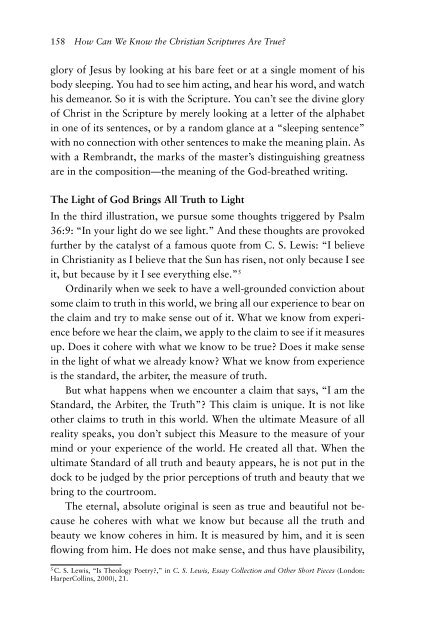Scriptures selfattesting authority question doctrine truthfulness Scriptures
peculiar-glory-en
peculiar-glory-en
You also want an ePaper? Increase the reach of your titles
YUMPU automatically turns print PDFs into web optimized ePapers that Google loves.
158 How Can We Know the Christian <strong>Scriptures</strong> Are True?<br />
glory of Jesus by looking at his bare feet or at a single moment of his<br />
body sleeping. You had to see him acting, and hear his word, and watch<br />
his demeanor. So it is with the Scripture. You can’t see the divine glory<br />
of Christ in the Scripture by merely looking at a letter of the alphabet<br />
in one of its sentences, or by a random glance at a “sleeping sentence”<br />
with no connection with other sentences to make the meaning plain. As<br />
with a Rembrandt, the marks of the master’s distinguishing greatness<br />
are in the composition—the meaning of the God-breathed writing.<br />
The Light of God Brings All Truth to Light<br />
In the third illustration, we pursue some thoughts triggered by Psalm<br />
36:9: “In your light do we see light.” And these thoughts are provoked<br />
further by the catalyst of a famous quote from C. S. Lewis: “I believe<br />
in Christianity as I believe that the Sun has risen, not only because I see<br />
it, but because by it I see everything else.” 5<br />
Ordinarily when we seek to have a well-grounded conviction about<br />
some claim to truth in this world, we bring all our experience to bear on<br />
the claim and try to make sense out of it. What we know from experience<br />
before we hear the claim, we apply to the claim to see if it measures<br />
up. Does it cohere with what we know to be true? Does it make sense<br />
in the light of what we already know? What we know from experience<br />
is the standard, the arbiter, the measure of truth.<br />
But what happens when we encounter a claim that says, “I am the<br />
Standard, the Arbiter, the Truth”? This claim is unique. It is not like<br />
other claims to truth in this world. When the ultimate Measure of all<br />
reality speaks, you don’t subject this Measure to the measure of your<br />
mind or your experience of the world. He created all that. When the<br />
ultimate Standard of all truth and beauty appears, he is not put in the<br />
dock to be judged by the prior perceptions of truth and beauty that we<br />
bring to the courtroom.<br />
The eternal, absolute original is seen as true and beautiful not because<br />
he coheres with what we know but because all the truth and<br />
beauty we know coheres in him. It is measured by him, and it is seen<br />
flowing from him. He does not make sense, and thus have plausibility,<br />
5<br />
C. S. Lewis, “Is Theology Poetry?,” in C. S. Lewis, Essay Collection and Other Short Pieces (London:<br />
HarperCollins, 2000), 21.


